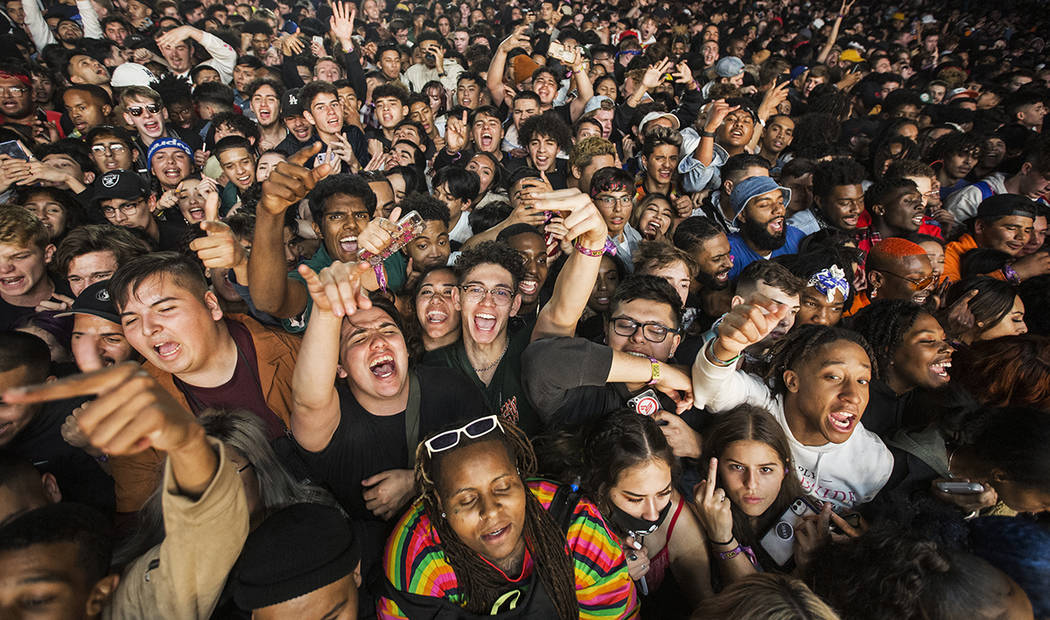Infectious energy defines Day N Vegas festival debut

The chains came off and it was on.
Placing his jewelry on the DJ booth, Lil Uzi Vert posed a rhetorical question akin to asking a dying man if he cared if the Grim Reaper took five.
“Y’all want me to come out there?” the hoodie-clad rapper wondered to cheers as lusty as the women who populate his alternately libidinous and tough-nosed songbook, his voice rising in the night air like a lungful of exhaled smoke.
And with that, he clambered down into the crowd, pressing flesh cold to the touch.
It was a bit past 10 p.m. on a chilly Friday evening and Day N Vegas was winding down.
The new three-day hip-hop festival debuted at the Las Vegas Festival Grounds to a sold-out throng of tens of thousands, a number of the more skimpily dressed attendees huddling around heat lamps, seeking warmth from flames in place of fabrics.
Lil Uzi Vert, a man who possesses a N’oreaster’s bluster, originally was scheduled to perform an hour earlier on the festival’s Jackpot stage, its largest, but because of travel issues, commanded the more intimate Roll the Dice stage instead.
It was a scene that encapsulated the no frills, more in-your-face feel of the festival itself, which largely eschewed the bells-and-whistles and carnival rides and craft beers and myriad selfie spots that have to come increasingly define the modern music fest.
At other popular Las Vegas destination festivals like the electronic dance music-centered Electric Daisy Carnival and the wider-ranging Life is Beautiful, the idea is to create an experience beyond the music, an immersive atmosphere where the performers on stage are but one part of the draw — and maybe not always the most important part, which is at least partially why EDC brands its fans “headliners,” for instance.
In this context, Day N Vegas felt like a bit of a throwback, a straight-up, unostentatious music festival with three stages erected upon acres of asphalt ringed by various food and drink vendors.
There were the requisite amenities, like a large, well-appointed V.I.P. section, and plenty of the aforementioned booze and snack offerings, meaning there was no dearth of Hennessy and fried pickles.
But the footprint was simple and easily navigable with the stages relatively close together, resulting in large clumps of humanity forsaking personal space for full-contact revelry.
As to be expected from a first-year festival, there were some hiccups.
For locals looking to drive to Day N Vegas, the lack of parking was a serious logistical hurdle, with most surrounding casinos closing their garages to non-guests, making ride-sharing really the only viable way of getting there without parking further down The Strip and either walking long distances or taking the monorail.
Not everything ran smoothly inside the festival, either.
R&B singer Summer Walker took to the Roll the Dice stage 20 minutes late only to exit after one song, presumably because of poor sound mixing, her voice barely audible amid the crashing drums and purring synth lines. She came back shortly thereafter, eventually joined by a couple of pole dancers, ending her performance after roughly 15 minutes amid vocal displeasure from the large crowd that waited to see her.
“Girls need love too,” she sang during her closing number of roughly the same name.
Clearly.
Meanwhile, Lil Uzi Vert’s aforementioned tardiness also caused performance times and stages to be juggled, with headliner J. Cole’s set pushed back 20 minutes and R&B singer-rapper 6lack taking Lil Uzi Vert’s place on the Jackpot stage.
Speed bumps aside, the energy inside the fest was palpable, infectious.
“I know you weren’t expecting to hear real guitar and drums from the stage,” soul standout Miguel mused towards the end of his time on the Jackpot stage, but he wasn’t alone in playing with a backing band that added a more visceral, kinetic feel to his performance.
Fellow R&B changeling 6lack (pronounced “black”) also incorporated live instrumentation into his warm-blooded performance, where he gave smooth, impassioned voice to songs about conquering fears and warring with one’s ego, as did headliner J. Cole.
Prefacing his set with a mock campaign add hyping his forthcoming new album “The Fall Off” before taking to the red, white and blue adorned stage, Cole worked the crowd like a politician on the stump.
He fancies himself the conscience of contemporary hip-hop, and carries himself as such, rapping earnestly with his eyes closed, a lyrical technician with a heart as big as his vocabulary.
“I hope you know money won’t erase the pain,” he explained on opener “Middle Child,” sounding a recurring theme in his catalog: the pitfalls of conspicuous consumption.
Now, Cole certainly doesn’t decry wealth or its pursuit — “Since a youngin’ always dreamed of gettin’ rich” — but when he acknowledges the achievement of his childhood aspirations, he does so with an eye to the broader ramification of this fulfillment (“What good is the bread if my (people) is broke? / What good is first class if my (people) can’t sit?”).
Cole acknowledges the feeling of validation that comes from success, from having everything when you come from nothing.
He doesn’t want to rain on any fellow rapper’s hit parade.
But he does provide some food for thought on the American dream — a buffet, in fact — while also providing the road map to its actualization.
“If practice makes perfect,” he rhymed on “KOD,” “I’m practice’s baby. ”
And then he repeated the line again, because, you know, practice makes perfect.
Contact Jason Bracelin at jbracelin@reviewjournal.com or 702-383-0476. Follow @JasonBracelin on Twitter.